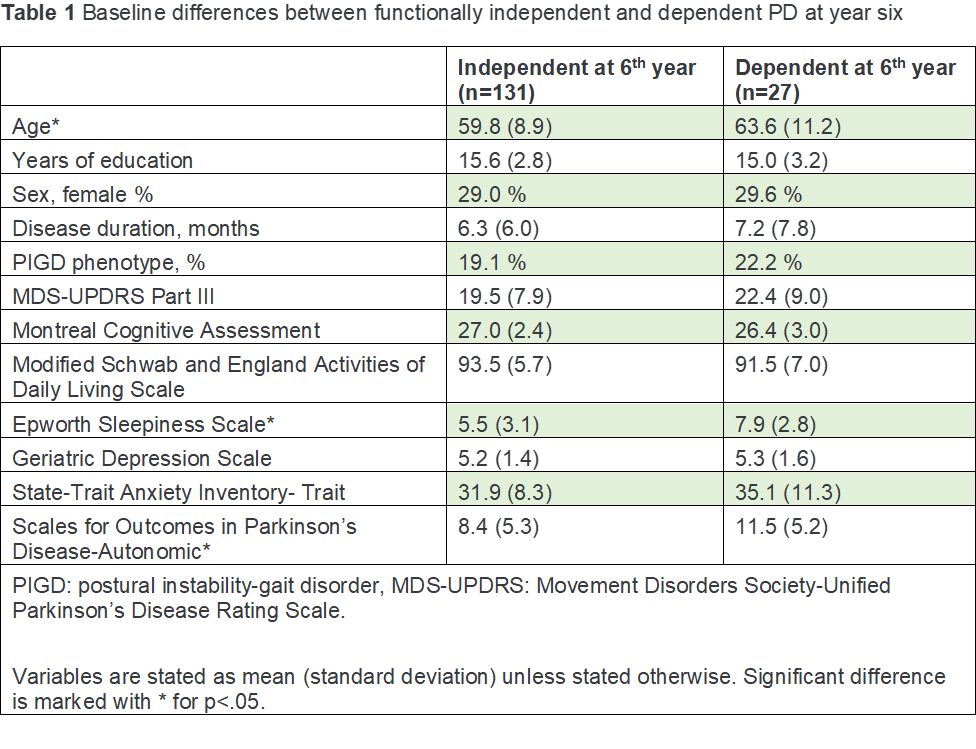Session Information
Date: Tuesday, September 24, 2019
Session Title: Parkinsonisms and Parkinson-Plus
Session Time: 1:45pm-3:15pm
Location: Agora 3 West, Level 3
Objective: To investigate whether daytime sleepiness in newly diagnosed Parkinson’s disease (PD) patients predicts future dependency.
Background: Excessive daytime sleepiness (EDS) is one of the common early non-motor symptoms of PD affecting 33.9% of patients (1). Although EDS does not seem to be associated with motor impairment in de novo PD (2), longitudinal studies revealed associations between EDS and postural instability-gait disorder (PIGD) motor phenotype (3). As the PIGD phenotype is a predictor of more rapid disability development in PD (4), daytime sleepiness may be related to future functional dependency.
Method: Data of 158 de novo PD patients with baseline and year six evaluations was obtained from Parkinson Progression Markers Initiative (PPMI). Functional dependency was determined by a score below 80 on Modified Schwab and England Activities of Daily Living Scale (ADL); as 80 is the last score for complete independency. Baseline demographics, disease characteristics, and daytime sleepiness scores (assessed by Epworth Sleepiness Scale, ESS) were compared between patients who were dependent or independent at 6th year. Association between baseline ESS scores and dependency at year six was evaluated with logistic regression. Other covariates included in the model were; mood and autonomic dysfunction due to their associations with daytime sleepiness in de novo PD (2); age, cognition (assessed by Montreal Cognitive Assessment, MoCA), motor severity and phenotype due to previous association between PIGD and disability in PD (5).
Results: Out of 158 functionally independent PD patients at baseline, 17.1 % were dependent at the 6th year. Baseline differences between groups are summarized in Table 1. Patients who became dependent at year six were older at baseline when newly diagnosed with PD, and had higher scores on sleepiness and autonomic symptoms scales. Older age and higher ESS score at baseline were associated with dependency at 6th year (Table 2). None of the other factors were significant.
Conclusion: Higher baseline daytime sleepiness scores in de novo PD predicts with dependency at 6th year. Daytime sleepiness is an important symptom to not be overlooked, and determining its pathophysiology may be helpful to delay future dependency.
References: 1. Chen H, Zhao EJ, Zhang W, et al. Meta-analyses on prevalence of selected Parkinson’s nonmotor symptoms before and after diagnosis. Transl Neurodegener. 2015;4(1):1. doi:10.1186/2047-9158-4-1 2. Simuni T, Caspell-Garcia C, Coffey C, et al. Correlates of excessive daytime sleepiness in de novo Parkinson’s disease: A case control study. Mov Disord. 2015;30(10):1371-1381. doi:10.1002/mds.26248 3. Amara AW, Chahine LM, Caspell-Garcia C, et al. Longitudinal assessment of excessive daytime sleepiness in early Parkinson’s disease. J Neurol Neurosurg Psychiatry. 2017;88(8):653-662. doi:10.1136/jnnp-2016-315023 4. Post B, Merkus MP, de Haan RJ, Speelman JD, CARPA Study Group. Prognostic factors for the progression of Parkinson’s disease: A systematic review. Mov Disord. 2007;22(13):1839-1851. doi:10.1002/mds.21537 5. Macleod AD, Counsell CE. Predictors of functional dependency in Parkinson’s disease. Mov Disord. 2016;31(10):1482-1488. doi:10.1002/mds.26751
To cite this abstract in AMA style:
E. Bayram, R. Yilmaz, K. Longardner, M. Akbostanci, I. Litvan. Daytime Sleepiness Effects on Motor Symptoms in De Novo Parkinson’s Disease [abstract]. Mov Disord. 2019; 34 (suppl 2). https://www.mdsabstracts.org/abstract/daytime-sleepiness-effects-on-motor-symptoms-in-de-novo-parkinsons-disease/. Accessed April 26, 2025.« Back to 2019 International Congress
MDS Abstracts - https://www.mdsabstracts.org/abstract/daytime-sleepiness-effects-on-motor-symptoms-in-de-novo-parkinsons-disease/


